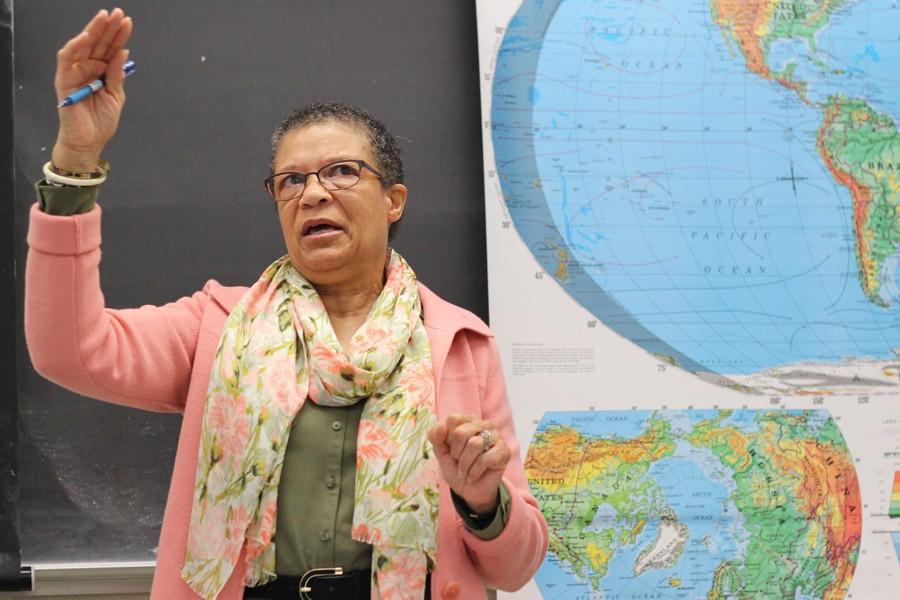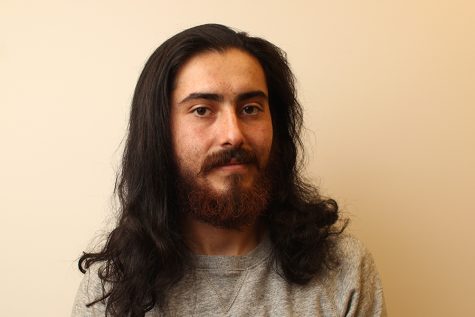Educator provides a holistic historical perspective
Christian Urrutia / The Advocate
African- American studies department Chairperson Carolyn Hodge lectures during her History of African Americans in the U.S. class in LA-103 on Thursday. Hodge had a supplemental role in remodeling Contra Costa College’s African-American studies program almost 16 years ago when she was first hired.
Mar 17, 2015
A passionate pursuit of knowledge compelled a strong-willed, caring woman to leave her home to invest in the lives of students, professors and programs at Contra Costa College.
Black Student Union Vice President Bridgette Lott said, “At first I thought to myself, OK, I’m going to go to this (history) class and just go about my business.”
“But once I sat down and opened myself to what (my professor) was offering it made me more appreciative of people who pos- sess that much knowledge and are willing to share it with others. It makes me want to do the same.”
African-American studies department Chairperson Carolyn Hodge left her hometown of Kalamazoo, Michigan and worked in five different states before her travels brought her to enroll in San Francisco State University in 1980.
Hodge, however, dropped out of Western Michigan State University in the late 1960s just as the civil rights movement was dying and the brief Summer of Love had begun to blossom.
She said it wasn’t until she experienced the rich ethnic diversity of people living in the Bay Area that she realized what it was she wanted to do with her life and the reason it took her 14 years and thousands of miles to find out.
“When I was enrolled at SFSU I discovered that not only did it have a black studies department but it also offered Native American, Chicano, Asian-American courses,” she said, “I wanted to know all of it. So I told myself that I am going to teach history, but I needed all the pieces of the puzzle first.”
She graduated with a double major in Africana studies/social science and a double minor in American Indian studies/history by 1994.
Lott said, “(Hodge) helped me and other students improve our leadership and organi- zation skills because she is the BSU’s adviser, but she also helps us find our academic paths through her teaching.”
She said she will be transferring to SFSU in the upcoming fall semester after taking Hodge’s recommendation.
History professor Manu Ampim said, “Hodge always puts students first. She is the kind of person who is never satisfied with what she knows and is always learning.”
Hodge took what she learned while doing her undergraduate work under the nation’s first black studies department at a major university and eventually remodeled CCC’s African-American studies program after SFSU’s.
Ampim said it has been 16 years since the college first had an African-American studies department thanks to Hodge and former dean of the Natural, Social and Applied Science Division Terrence Elliot.
“(Hodge) established credibility for the African-American studies department at CCC by bringing the standards used at SFSU,” Ampim said. “When (Hodge) came to CCC, there was already an African-American studies program but it was not a solidified department.”
He said this is because the professors before Hodge and Elliot did not have proper credentials to teach such a specialized field of study.
Former CCC student and 2008-10 BSU president Jasmyn Oliver recently graduated from UC Berkeley with a double major in ethnic and media studies.
Oliver recently returned to campus to speak with Hodge and Ampim to reminisce with her old BSU advisers and history professors.
“I was excited to take (Hodge’s history) class because a lot of students who took her before were telling me her class was hard and I should drop,” she said. “So this made me want to take her class even more and once I was enrolled I was not disappointed.”
Oliver said the workload Hodge assigns students is “exactly” the same amount she was given at UC Berkeley.
However, she said she regrets not taking Hodge’s advice to go to SFSU instead.
“Take her class if you can so you can get prepared for the upper division work because your undergraduate work will happen wherever you decide to go.”
Lott was also attracted to take Hodge’s classes because it seemed challenging and also because it was being taught by a strong African-American woman.
Oliver said more often than not gender is used to categorize people and set limitations but can be overcome through hard work and resilience.
“Women (professors) are needed everywhere,” she said. “Not only for young females to know they are important, but for young males to respect and understand that gender has nothing to do with personal skill levels or accomplishments.”
Lott said the topics Hodge covers in class are focused on the socioeconomic struggles of ethnic minorities in the United States while tracing the ancestry of these groups back to their countries of origin.
La Raza studies professor Agustin Palacios has shared an office with Hodge since he was hired as a full-time professor in 2009.
“Hodge is experienced,” Palacios said. “She has a good personality that welcomes students to strengthen theirs while also opening them to new ideas.”
The same year he was hired, the Chicano studies was merged with African-American studies through an administrative decision.
He said both of these areas of study fall under cultural ethnic studies that originate from the struggles of the 1960s and 70s experienced by people of color in the U.S.
Both Lott and Oliver agree that learning other culture’s history is just as important as learning your own.
Palacios said, “It’s important for students have a department that takes historical cultural and social issues seriously to produce future scholars and activists of color,” he said. “We both share the struggle for social justice.”



